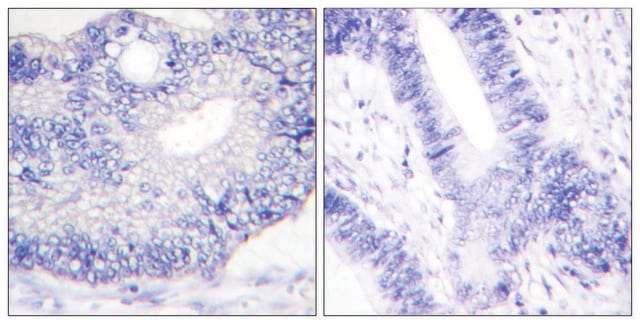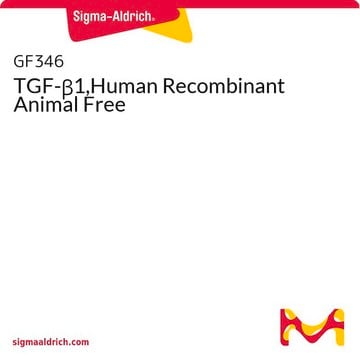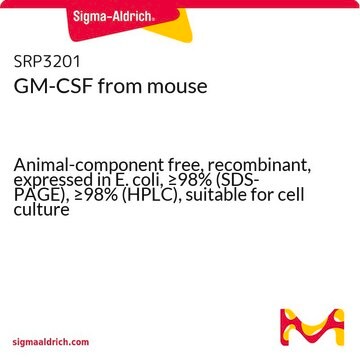This antibody can be used with both formalin-fixed paraffin-embedded (FFPE) tissue sections and frozen sections.
T0438
Monoclonal Anti-Transforming Growth Factor-β1 antibody produced in mouse
clone 9016, purified immunoglobulin, lyophilized powder
Synonym(s):
Anti-TGF-β1, CEDLAP, DPD1, latency-associated peptide
About This Item
Recommended Products
biological source
mouse
Quality Level
conjugate
unconjugated
antibody form
purified immunoglobulin
antibody product type
primary antibodies
clone
9016, monoclonal
form
lyophilized powder
species reactivity
mouse, human, rat
technique(s)
ELISA: suitable
flow cytometry: suitable
immunocytochemistry: suitable
immunohistochemistry: suitable
neutralization: suitable
western blot: suitable
isotype
IgG1
UniProt accession no.
application(s)
research pathology
storage temp.
−20°C
target post-translational modification
unmodified
Gene Information
human ... TGFB1(7040)
mouse ... Tgfb1(21803)
rat ... Tgfb1(59086)
General description
Specificity
Immunogen
Application
Western Blot 1 ug/mL (under non-reducing conditions only)
Immunohistochemistry 3-25 μg/mL
Flow Cytometry 2.5 μg/106 cells
ELISA capture 2-8 μg/mL
ELISA detection 0.1-0.4 μg/mL
Neutrilization 0.3-1.0 μg/mL
- immunohistochemical detection of TGFβ1 in smooth muscle(2) and liver sections
- western blotting and ELISA of brain specimens
- immunoblot detection of TGFβ1 in macrophages
Physical form
Reconstitution
Other Notes
Disclaimer
Not finding the right product?
Try our Product Selector Tool.
Storage Class
11 - Combustible Solids
wgk_germany
WGK 3
flash_point_f
Not applicable
flash_point_c
Not applicable
ppe
Eyeshields, Gloves, type N95 (US)
Choose from one of the most recent versions:
Already Own This Product?
Find documentation for the products that you have recently purchased in the Document Library.
Customers Also Viewed
-
Can Product T0438, Monoclonal Anti-Transforming Growth Factor-?1 antibody produced in mouse, be used for immunohistochemistry with frozen and/or formalin-fixed paraffin-embedded sections?
1 answer-
Helpful?
-
-
How is Product T0438, Monoclonal Anti-Transforming Growth Factor-?1 antibody produced in mouse, different than T0688, Anti-Transforming Growth Factor-?1 antibody produced in chicken?
1 answer-
These two antibodies are very similar in regards to the applications they are suitable for. They do differ in a few key areas. T0688 only recognizes active TGF-ß1 while T0438 recognizes both active and latent TGF-ß1. Also, T0438 is a mouse monoclonal antibody and T0688 is a chicken polyclonal antibody.
Helpful?
-
-
What is the Department of Transportation shipping information for this product?
1 answer-
Transportation information can be found in Section 14 of the product's (M)SDS.To access the shipping information for this material, use the link on the product detail page for the product.
Helpful?
-
-
How does the storage temperature relate to shipping conditions?
1 answer-
The storage conditions that a Sigma-Aldrich catalog and label recommend for products are deliberately conservative. For many products, long-term storage at low temperatures will increase the time during which they are expected to remain in specification and therefore are labeled accordingly. Where short-term storage, shipping time frame, or exposure to conditions other than those recommended for long-term storage will not affect product quality, Sigma-Aldrich will ship at ambient temperature. The products sensitive to short-term exposure to conditions other than their recommended long-term storage are shipped on wet or dry ice. Ambient temperature shipping helps to control shipping costs for our customers. At any time, our customers can request wet- or dry-ice shipment, but the special handling is at customer expense if our product history indicates that the product is stable for regular shipment.
Helpful?
-
-
What is the molecular weight of Product T0438, Monoclonal Anti-Transforming Growth Factor-?1 antibody produced in mouse,?
1 answer-
TGF-ß1 is a disulfide-linked homodimer of two 12.5 kDa subunits. Under non-reducing conditions, the T0438 antibody should detect a protein at 25 kDa.
Helpful?
-
-
Can Product T0438, Monoclonal Anti-Transforming Growth Factor-?1 antibody produced in mouse, be used to neutralize the biological activity of TGF-ß1?
1 answer-
Yes, this antibody will neutralize TGF-ß1.
Helpful?
-
-
Will Product T0438, Monoclonal Anti-Transforming Growth Factor-?1 antibody produced in mouse, work for intracellular flow cytometry?
1 answer-
This antibody can be used for intracellular flow cytometry. The cells should be fixed with 4% paraformaldehyde and permeabilized with a 0.1% saponin-containing buffer.
Helpful?
-
Active Filters
Our team of scientists has experience in all areas of research including Life Science, Material Science, Chemical Synthesis, Chromatography, Analytical and many others.
Contact Technical Service








